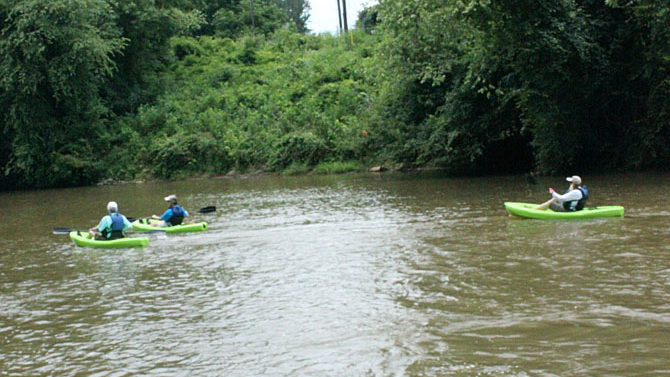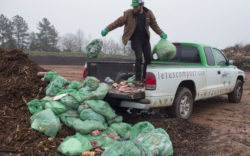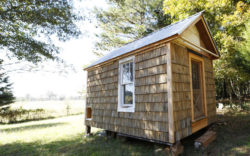Forget about trying to hike on this trail. If you do, be prepared to get wet.
With a $4,000 grant from Georgia River Network, the Upper Oconee Watershed Network is working with the Athens-Clarke County Leisure Services Department to establish the first blue trail, also known as a water trail, in Athens. This will provide kayakers, paddlers, swimmers and others public access to the Middle Oconee River. The first of two access points is set to be built in Ben Burton Park later this year.
“We’ve got a treasure running through our town and along the edge of our campus in the North and Middle Oconee rivers,” says Kevin Kirsche, director of the University of Georgia’s Office of Sustainability. “I think it’s really important for people to engage with the river in positive ways and that that engagement instills a value for the local river system.”
The grant comes from money raised by Paddle Georgia, an annual Georgia River Network event during which 350 people canoe and kayak 100 miles of Georgia rivers. A portion of each event’s profits is earmarked for an organization with goals of addressing water concerns and improving river recreation on the section of river traversed during the week.
“We really believe that by improving access to rivers in Georgia, more people will have the opportunity to get out and experience and develop a relationship with rivers, understand their importance in our lives and really develop appreciation,” Georgia River Network Executive Director April Ingle says.
UOWN won the grant in 2011, when Paddle Georgia participants explored the Middle Oconee and Oconee rivers. The organization then spent the next two years deciding what to do with the money. Plans to build on the North Oconee River fell through, but the Upper Oconee Watershed Network blue trail committee, chaired by Big Dog’s On the River owner Terry Stephens, decided the section of the Middle Oconee River that runs through Ben Burton Park would be a more immediately practical location for the first access point.
ACC Commissioner Allison Wright, a self-professed “water person,” came on board in January after Stephens approached her about an environmentalist comment she had made in a county commission meeting. Wright says she keeps kayaks and values the outdoors—particularly waterways.
“The greenway trail and all that network has its process, but the blue trail is sort of lacking in that voice, I felt like,” she says. “So when the opportunity came to be able to have a voice and to help it along, I just had to do it.”
River advocates hope providing public water access will encourage the public to take advantage of local waters and increase its concern for the environment.
“Once people value the river and interact with it positively, then I think they’ll be compelled to work to conserve or preserve the quality of the river itself,” Kirsche says.
In addition, Wright says, terracing to the water will lessen the vegetation damage and bank erosion presently caused by kayakers trampling plant life to reach the water.
Eventually, Stephens says, a second access point at Ben Burton Park will allow kayakers to leave the water early and spend more time in the park, instead of waiting to float back to Big Dogs’ location on Atlanta Highway. Building a second access point will make it easier for groups of paddlers to keep up with one another and provide a safe space for children’s water play, Wright says. And, Ingle says, building a blue trail—and eventually a whole network of trails—in Athens may boost the local economy by acting as a boon to the city’s tourism industry.
“I used to say all the time as a student here that Athens would be the greatest place in the world if there was a mountain or an ocean,” Kirsche says. “The outdoor opportunities are less apparent here, but they are present.”
Like what you just read? Support Flagpole by making a donation today. Every dollar you give helps fund our ongoing mission to provide Athens with quality, independent journalism.










